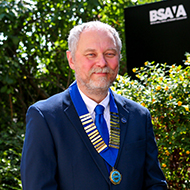
David Godfrey will lead the organisation for 2025-26.
Small animal dermatologist, David Godfrey, has began his role as president of the BSAVA for 2025-26.
David succeeds Julian Hoad - who has become senior vice president - and will continue to focus on BSAVA’s Programme of Change.
An Advanced Practitioner in small animal dermatology, David holds postgraduate qualifications in small animal dermatology and medicine.
Together with his wife, Rosie, he started the first feline-only practice in the UK. He is board certified in feline practice and has an RCVS Fellowship in feline osteoarthritis.
David was pivotal in the establishment of the BSAVA West Midlands Committee and was a BSAVA Council member and Chair of the regions for three years before joining the board and presidential ladder.
At the BSAVA’s Annual General Meeting (AGM) on Thursday (19 June), David said: “The whole of the veterinary profession is lucky to have the strength of the BSAVA. BSAVA has a robust team, and I greatly look forward to working with them.
“It is an honour being BSAVA President for 2025-2026, but this next year will not be about me. It will be about the renewal of BSAVA, it will hear us shouting out with an ever-increasing voice about the most exciting innovations and I promise to do my very best.”
As well as focusing on BSAVA’s programme of change, David will focus on BSAVA’s new strategy, which includes new products and services.
Julian Hoad said: "Iam incredibly grateful for the opportunity to serve as President over the past year. I am proud to call myself a member of the BSAVA. It’s an association that diligently serves and supports so many of our wonderful profession.”
Other changes to the BSAVA board include Niall Connell, who begins his new role as junior vice president. Niall will sit alongside Jo Megarity, who joins the board as Honorary Treasurer.
Image (C) BSAVA.



 RCVS Knowledge has called on vet practices to audit their post-operative neutering outcomes.
RCVS Knowledge has called on vet practices to audit their post-operative neutering outcomes.